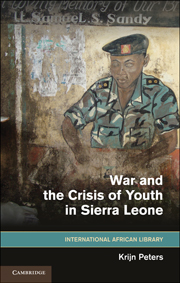Book contents
- Frontmatter
- Contents
- Acknowledgements
- Abbreviations
- Introduction
- 1 Voices from the Battlefield: Ex-Combatants' Views on Root Causes of the War and Their Reasons for Participation
- 2 The Socio-Economic Crisis of Rural Youth
- 3 Conflict in Sierra Leone and Recruits to the War
- 4 The World of the RUF
- 5 Malfunctions and Atrocities
- 6 Cultivating Peace: RUF Ex-Combatants' Involvement in Post-War Agricultural Projects
- 7 Footpaths to Reintegration? Agrarian Solutions for the Reintegration of Ex-Combatants
- 8 Conclusion: The RUF as a Rural Underclass Project
- Epilogue
- Annex I A Chronology
- Annex II Overview: Interviewed Ex-RUF Combatants
- References
- Index
- THE INTERNATIONAL AFRICAN LIBRARY
1 - Voices from the Battlefield: Ex-Combatants' Views on Root Causes of the War and Their Reasons for Participation
Published online by Cambridge University Press: 03 May 2011
- Frontmatter
- Contents
- Acknowledgements
- Abbreviations
- Introduction
- 1 Voices from the Battlefield: Ex-Combatants' Views on Root Causes of the War and Their Reasons for Participation
- 2 The Socio-Economic Crisis of Rural Youth
- 3 Conflict in Sierra Leone and Recruits to the War
- 4 The World of the RUF
- 5 Malfunctions and Atrocities
- 6 Cultivating Peace: RUF Ex-Combatants' Involvement in Post-War Agricultural Projects
- 7 Footpaths to Reintegration? Agrarian Solutions for the Reintegration of Ex-Combatants
- 8 Conclusion: The RUF as a Rural Underclass Project
- Epilogue
- Annex I A Chronology
- Annex II Overview: Interviewed Ex-RUF Combatants
- References
- Index
- THE INTERNATIONAL AFRICAN LIBRARY
Summary
Introduction
If scholars cannot agree about the root causes of the war in Sierra Leone, a different approach may be needed: one that pays more attention to those who experienced the conflict at first hand as combatants. This chapter presents ex-combatants' answers to question about causes of the war and why they took up arms. Ex-combatants tend to be ignored as a potential source, being considered too unreliable, too politicised, too traumatised, or, in the case of ex-child soldiers, just too young. But over the last decade or so various academic studies have appeared in which the agency of young fighters in ‘new wars’ is taken seriously. It is now recognised that these studies throw considerable light on the dynamics of the conflicts in question (cf. Peters and Richards 1998a, 1998b; Veale 2003; Brett and Specht 2004; Abdullah 2004; Peters 2004).
The format of this chapter is straightforward. A sample of informants is examined by faction (i.e., RUF, government army, and CDF) and their answers to the basic questions ‘What caused the war?’ and ‘Why did you take part’ are examined. The key to research of this kind is opportunity. The pattern of the war was complex, and intervals in the fighting over several years (1996, 1997, and 2001) followed by a definitive peace (2002 and onwards) opened up possibilities to work with various groups of demobilised or demobilising fighters. My approach is qualitative and contextual.
- Type
- Chapter
- Information
- War and the Crisis of Youth in Sierra Leone , pp. 18 - 33Publisher: Cambridge University PressPrint publication year: 2011



